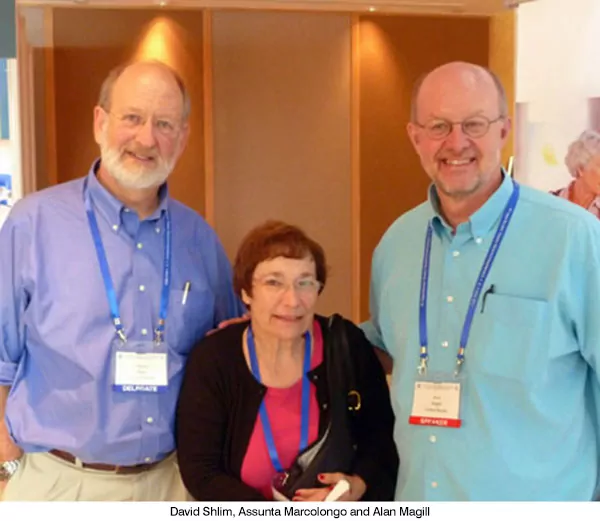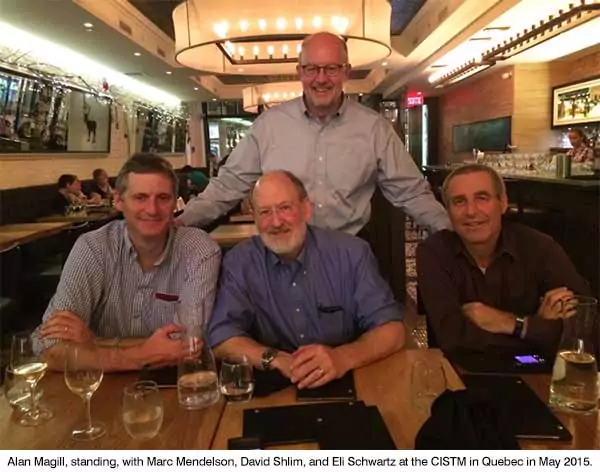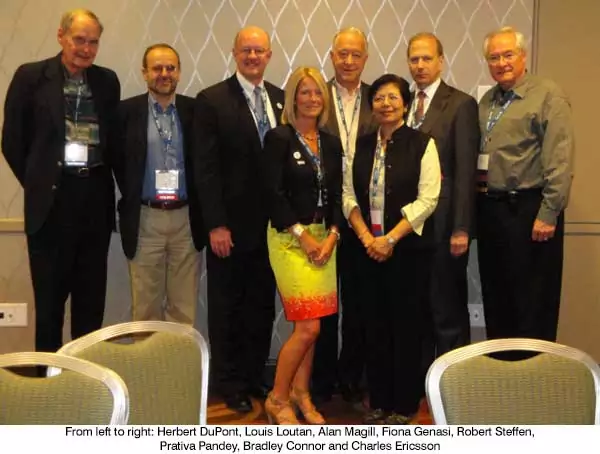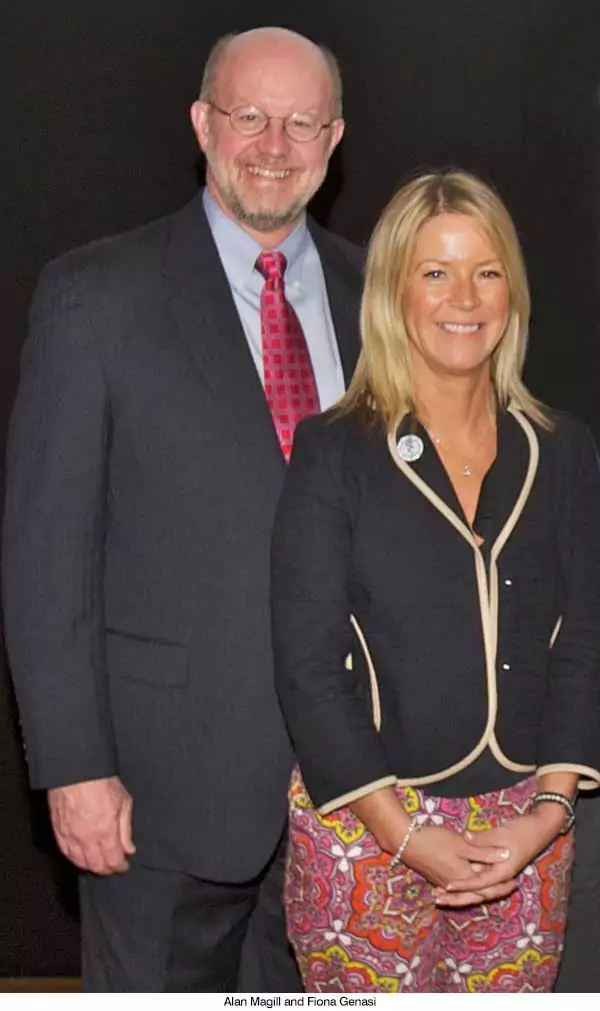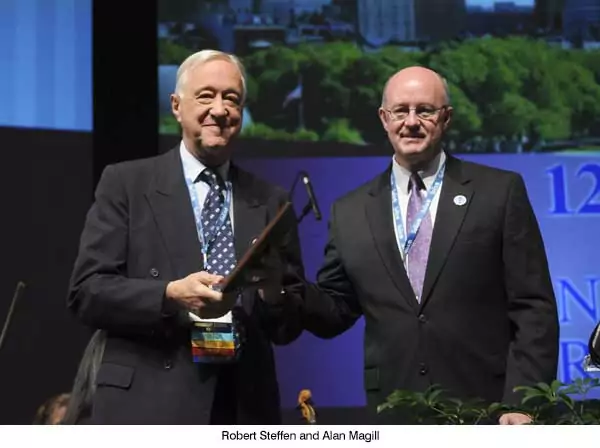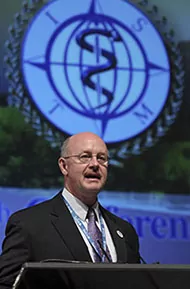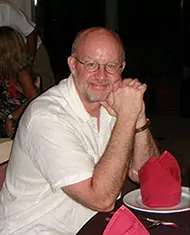In Memory of Alan J. Magill
Tributes from Colleagues & Friends
One of Alan Magill’s close friends, a doctor whom he had known since medical school, called me on Saturday, September 19th, to tell me that Alan had died that morning. He said that Alan had gone to a gym with his daughter to work out, and when they were driving home, a few blocks from their house, Alan suddenly pulled the car over to the curb, set the parking brake, and collapsed onto the steering wheel. His daughter, a recent college graduate, had the presence of mind—she was a Magill—to call 911, then pull Alan out of the car onto the street and start cardiopulmonary resuscitation. By chance, the first car to come upon the scene was driven by a doctor, who stopped to help. However, Alan never regained a cardiac rhythm.
I like to think about Alan in his last few seconds, suddenly aware that something was terribly wrong, but only thinking about his daughter’s safety, steering the car skillfully to a stop—and setting the parking brake—before he lost consciousness. This seems so typical of Alan Magill—his presence of mind, coming up with a plan, and thinking only of others.
I first met Alan in 1994, when I invited him to speak at a Medicine for Adventure Travel conference in Jackson Hole, Wyoming. I didn’t know him, and hadn’t heard him speak, so I was nervous about putting him on the program, but he was well recommended by a friend of mine who knew him well. It always seemed so ironic, in retrospect, to have been hesitant to put Alan Magill on a program. He proved to be the clearest, warmest, most insightful speaker that one could hope to see. This was Alan’s first foray into travel medicine, as he was a researcher for the U.S. army at the time, working in malaria and leischmaniasis.
Alan was an avid outdoors person, who raced bicycles in Europe while he was stationed there in the 1980s, skied for a U.S. army ski team, and climbed mountains, including ascents of Denali in Alaska, and a first ascent of a mountain in Tibet. He and his family often did long backpacking trips. He loved coming to Jackson Hole, and we went rock climbing together and road biking each time he came. When he was considering retiring from the army, he and his wife, Janiine, seriously looked into moving to Jackson Hole. Instead, Alan ended up taking a job at the Gates Foundation, as the head of their malaria eradication program. When he took that job, he had to choose between accepting a position as the head of infectious diseases at a major university, or the less certain path of working for a foundation. I urged him to go to the Gates Foundation where the potential for leaving a lasting legacy, befitting his great talents and potential, could be more easily realized.
Unlike a number of army researchers that I have worked with, Alan was active duty in the military, and was deployed to war zones in emergencies. I remember his vivid description to me of the massive array of invading forces that streamed across the desert from Kuwait into Iraq—which evoked Star Wars movies in his mind—when the U.S. invaded that country in 2003. Alan was there to counteract potential biologic warfare weapons that it was feared that the Iraqis might deploy.
In the wake of Alan’s untimely death—he was only sixty-one years old—I’ve never seen an outpouring of such universally admiring praise, not just for his research ability, but for every aspect of his life and personality. Those who worked with him are in awe of his leadership ability, which will remain legendary: he quietly could steer any organization in the right direction, and inspire everyone with the attitude that problems can be solved. At meetings he was often the last to speak, and when he did he summed up the often contentious discussion with an insight that steered everyone in the right direction. Everything that I know about running meetings and trying to provide leadership I learned from Alan Magill.
Alan became the president of ISTM in 2009. He oversaw a difficult and somewhat painful change as the ISTM transitioned from operating out of an employee’s home, to hiring an executive director and creating a designated ISTM office in Atlanta. Whom to hire, where to put the office (on which continent), and many other aspects were contentious from the beginning. Under Alan’s watch, all of these problems got solved, one by one, and he never shied away from the difficult decision or the difficult phone call.
However, what I will remember most about Alan were his intellectual abilities. Unlike anyone else I knew, Alan would look at what we knew about travel or tropical medicine and ask how it was that we came to know that. He was not content to repeat what had been published in a textbook or journal. For example, Alan decided to look into how we treated P vivax malaria. It turned out that there were no studies to support the dosage and efficacy of primaquine; the duration of treatment had been based on the duration of the boat trip home from the Pacific at the end of World War II. Alan performed this historical evaluation on many different diseases, and it would be a fitting legacy to him if we could all remember to ask ourselves, “How do we know that this is true?” His example led me to discover that the entire calculation of the risk of hepatitis B in travelers was based on one study in missionaries to Africa in the 1950’s.
Alan was devoted to his family above all, and they carried out many adventurous trips together. His wife, Janiine, was also in the U.S. army. Trained as a pediatrician, she supervised clinical trials for much of her career, then when they moved to Seattle, joined the Children’s Hospital of the University of Washington as a pediatric oncologist. Alan’s daughters are both college graduates, and pursuing careers that help other people. They were energetic children, and one time at a party at my house in Jackson Hole, someone came in to say that there were two young girls running around outside with burning sticks. Without even looking up, Alan said, “Those would be mine.”
I can’t think of anyone else in my life who was so universally loved and admired. Alan never said anything bad about anyone, a trait that we could all learn from. He never tried to avoid the difficult decision or task. When he took on the challenge of trying to eliminate malaria from the world, one automatically assumed that if anyone could design such a program, it would be Alan. Sadly, I think it is genuinely true that the time frame for eliminating malaria in the world will probably be set back by the loss of his leadership and vision. He enthusiastically embraced the mission statement that I created for my presidency of ISTM, in that “the ideal form of travel medicine would be the kind that makes it unnecessary.” If there’s no malaria in the world, there’s no need to discuss malaria prophylaxis.
Alan treated everyone in his life the same way, with kindness and directness, whether they were patients, colleagues in other countries, friends, or family. There was never a dumb question around Alan. Everyone counted Alan as a friend, and as a resource for any difficult tropical medicine question. As the editor of Hunter’s Tropical Medicine, Alan’s knowledge of tropical medicine became even more encyclopedic. I called him last year to ask him about a patient who had been in Panama and had three weeks of fatigue, minor respiratory symptoms, and a fever every night at 7:00 p.m. He didn’t readily know what he had, but he said, “You know, histoplasmosis was discovered in Panama. Has he been in a cave?” I went back to the patient and asked him, and he said that he had spent an hour exploring a cave looking for exotic insects. Histoplasmosis proved to be the diagnosis.
I want to share what Jay Keystone, another former president of ISTM, wrote to me upon hearing of Alan’s death. Jay has recently been awarded the Order of Canada for his lifetime work in travel and tropical medicine, yet he credits Alan as being one of his greatest teachers:
Alan was a brilliant teacher, the best that I have ever had the pleasure to learn from. He had the ability to simplify difficult concepts and to present them in a way that was both understandable and memorable. He will be missed, but his legacy as an outstanding educator, leader and caring human being will remain far beyond his too short life.
For all of us in travel or tropical medicine, we need to carry Alan’s legacy forward as much as we can, remembering to treat everyone with kindness, to question what we know, to look things up, and to teach others when we can. I can’t imagine anyone in medicine who was a more inspiring teacher and friend than Alan Magill.
David R Shlim MD
A sunset walk on the beach
the seagulls loud cries pierce the night
Yet tonight my cries are louder
As today informed of a good man’s passing
Too young, too good, to lose but gone …
A scholar, a teacher
A friend, a father
A man of intellect, compassion, and faith …
to believe one could truly make
this world a better place
No two of him will ever be
No DNA clone of Alan will we ever see
Taken from us far too young
he has moved on
to eternity and beyond
A place where no malaria, TB, or HIV
will steal one’s child in the night
He no longer needs to head that fight
No more lectures to plan
No more emails to write
You worked endlessly, so we could learn
Now, for you, a well deserved rest
For the man who did his very best
Rest in peace my friend
you will be sorely missed
but you left us with
your best lesson yet
The example,
of a life well spent
for the greater good of all,
both those great and small
A life, we should
and so wish we could,
strive to follow,
in hopes to ease
our extreme sorrow
Mary-Louise Scully
Dedicated to the memory of Alan Magill
It’s the thinking that’s all wrong.
You slide into your seat, trying not to jostle your fellow conference attendees. It seems so familiar: the padded chairs in a nondescript color, the small podium at the front of the room with larger-than-life PowerPoint slides projected on twin screens, flanking a panel of industry experts sitting at the elevated table.
This is a most unlikely place for a single man to completely change the thinking of hundreds of well-educated dedicated healthcare providers.
You have gathered in Québec with your fellow tropical medicine professionals to learn the newest ideas and techniques for keeping people safe when the travel. Today’s talks are centered on treating malaria.
All morning the talks have focused on resistance to malaria medications and insecticides. Experts have shown with pinpoint accuracy the burden of malaria by chronicling lives lost, persistent poverty, and the danger caused by fake medications.
A middle-aged balding man with glasses and a greying beard takes the podium. Polite applause.
You know he has something important to say. After all, his entire job description at the Bill and Melinda Gates Foundation is “Eliminate malaria”. Only two words, that’s it.
You wonder. What will be the new weapon?
Is it a new drug? Maybe a vaccine? Better insecticide?
So you listen.
In a calm voice, with warmth and confidence Dr. Magill reviews our current battle plans. How we developed new tactics and weapons for the war on malaria.
With each new drug or technique, with each escalation the malaria parasite develops better resistance. You realize we are caught in an arms race with a parasite as old as humanity.
You nod. You know all these things and more. Good, you think to yourself. I’m up to date. I know what I need to know.
Malaria is a terrible infection. It causes untold tragedy in many tropical regions of the world. It’s a vicious killer; its preferred targets are pregnant women and young children.
In people who live, it causes recurrent or chronic infections and profound fatigue. Unable to work, crops don’t get planted and work doesn’t get done. Like an occupying force; it perpetuates a cycle of poverty and misery.
It’s also very dangerous for travelers. Visitors to infested areas can become very ill and die. They become collateral damage in a war between a parasite and mankind.
That’s when Dr. Magill calmly and quietly explains how you have been thinking about malaria all wrong:
“To save the life of the child, you must treat the mother and father.”
Silence.
Don’t just treat the sick person, but eradicate the reservoir of disease, which is hiding within other people. Malaria is hiding within the family members of the ill child. And they don’t have symptoms.
People stop tapping on their phones, sit up in their chairs and listen intently as he systematically laid out plans for guerrilla warfare.
This is no ordinary foe. It has been hiding in towns and villages, right under our noses. This enemy is well camouflaged.
He exhorts us to root out and choke off support for these terrorist parasites. To isolate and eradicate the parasites in the dry season. At a time when they can’t escape in the bellies of mosquitoes to spread their misery to neighboring villages.
You shift uncomfortably in your seat. It seems so obvious. Why didn’t we think of this before?
For years we have been battling malaria on many fronts: install systems for better care for sick people, better drugs to attack the parasite, better insecticides and nets to kill the mosquitoes that transmit malaria. And what do we have to show from this traditional plan?
Drug resistant parasites that swoop down in the middle of the night attacking sleeping villagers.
Inventing better weaponry is not sustainable.
Better drugs and better mosquito avoidance measures just lead to an escalation of warfare. An escalation of resistance. We need a new battle plan.
And Dr. Magill has it.
With a strangely reassuring voice he gave us our new plan for treating malaria. A methodical clear and hold strategy. You never let up.
You track the malaria parasite down in every town and village. You snuff out each little ember of resistance during the dry season, at a time when the parasite cannot mobilize and escape via mosquitoes.
You get the malaria out of the people. All the people, not just the sick ones.
This will take some coordination between tactical education forces, governmental programs, and medication supply.
In those areas where this has begun, there has been a persistent decline in deaths from malaria.
You wonder, how does this affect the traveler?
You realize that some day very soon people won’t need to take malaria pills when visiting tropical parts of the world. That you won’t see returning travelers with delays in diagnosis due to unfamiliarity of the disease. For now you will still need to advise people on ways to prevent and treat malaria while traveling. But the end is in sight.
But even more profoundly you wonder how can you apply this thinking to other problems? Which problems need a fresh pair of eyes?
You realize that how you define the problem is the key to how you design the solution.
Dr. Magill wasn’t tasked with find better drugs, fix healthcare infrastructure in malaria prone areas, or develop new mosquito avoidance procedures. He was given one simple task: Eliminate malaria.
And it looks like he is going to do this by using new thinking
note: Today I received the terrible news that the world has lost a great leader. Dr. Magill was one of my heroes. A man not afraid to learn and understand medical problems all the while rethinking things from the ground up. He was talented, inspiring, and a terrific educator. Truly we will miss him.

